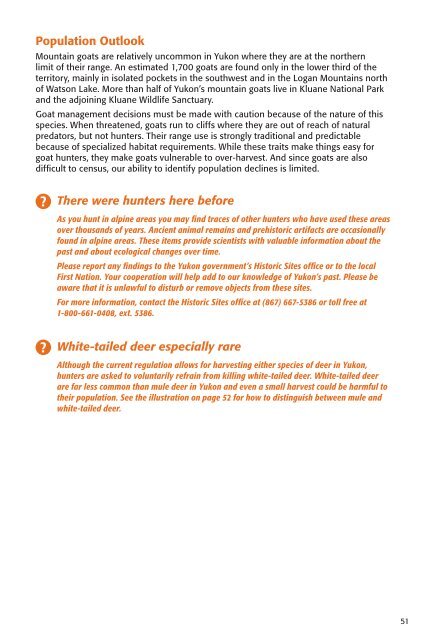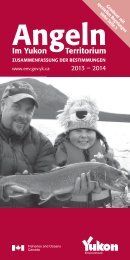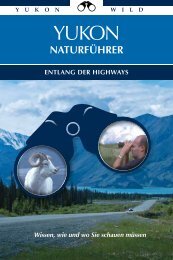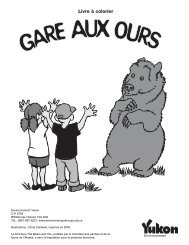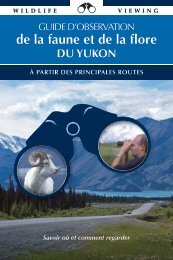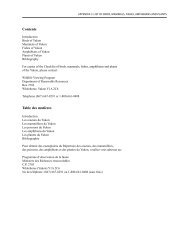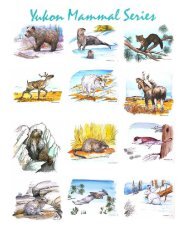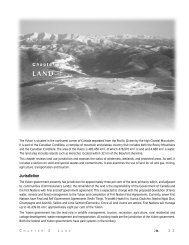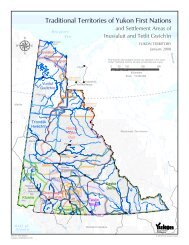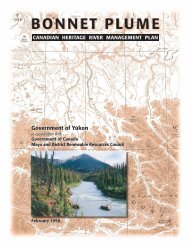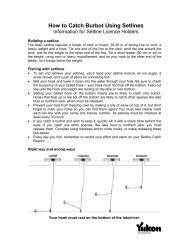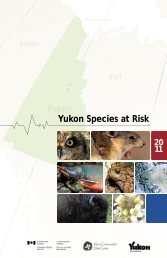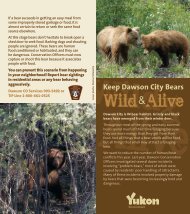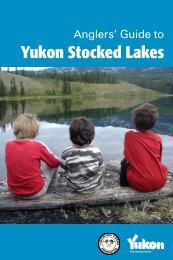Yukon Hunting - Department of Environment - Government of Yukon
Yukon Hunting - Department of Environment - Government of Yukon
Yukon Hunting - Department of Environment - Government of Yukon
Create successful ePaper yourself
Turn your PDF publications into a flip-book with our unique Google optimized e-Paper software.
Population Outlook<br />
Mountain goats are relatively uncommon in <strong>Yukon</strong> where they are at the northern<br />
limit <strong>of</strong> their range. An estimated 1,700 goats are found only in the lower third <strong>of</strong> the<br />
territory, mainly in isolated pockets in the southwest and in the Logan Mountains north<br />
<strong>of</strong> Watson Lake. More than half <strong>of</strong> <strong>Yukon</strong>’s mountain goats live in Kluane National Park<br />
and the adjoining Kluane Wildlife Sanctuary.<br />
Goat management decisions must be made with caution because <strong>of</strong> the nature <strong>of</strong> this<br />
species. When threatened, goats run to cliffs where they are out <strong>of</strong> reach <strong>of</strong> natural<br />
predators, but not hunters. Their range use is strongly traditional and predictable<br />
because <strong>of</strong> specialized habitat requirements. While these traits make things easy for<br />
goat hunters, they make goats vulnerable to over-harvest. And since goats are also<br />
difficult to census, our ability to identify population declines is limited.<br />
There were hunters here before<br />
As you hunt in alpine areas you may find traces <strong>of</strong> other hunters who have used these areas<br />
over thousands <strong>of</strong> years. Ancient animal remains and prehistoric artifacts are occasionally<br />
found in alpine areas. These items provide scientists with valuable information about the<br />
past and about ecological changes over time.<br />
Please report any findings to the <strong>Yukon</strong> government’s Historic Sites <strong>of</strong>fice or to the local<br />
First Nation. Your cooperation will help add to our knowledge <strong>of</strong> <strong>Yukon</strong>’s past. Please be<br />
aware that it is unlawful to disturb or remove objects from these sites.<br />
For more information, contact the Historic Sites <strong>of</strong>fice at (867) 667-5386 or toll free at<br />
1-800-661-0408, ext. 5386.<br />
White-tailed deer especially rare<br />
Although the current regulation allows for harvesting either species <strong>of</strong> deer in <strong>Yukon</strong>,<br />
hunters are asked to voluntarily refrain from killing white-tailed deer. White-tailed deer<br />
are far less common than mule deer in <strong>Yukon</strong> and even a small harvest could be harmful to<br />
their population. See the illustration on page 52 for how to distinguish between mule and<br />
white-tailed deer.<br />
51


